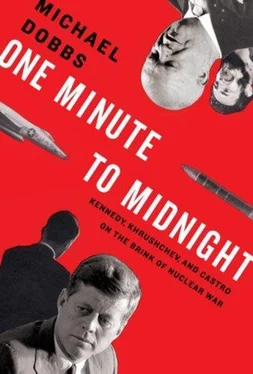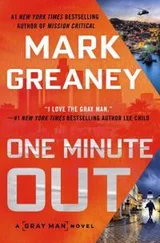He had been meeting the ABC correspondent over coffee and the occasional lunch for more than a year. If nothing else, the meetings were a way of improving his English. A voluble Italian-American, Scali was “an exuberant type” from whom it was relatively easy to extract information. Feklisov’s standard technique was simply to raise a topic that interested him and then insist at a certain point, “No, it can’t be.” Eager to display inside knowledge, Scali would reply with a comment such as “What do you mean, it can’t be? The meeting took place last Tuesday at four p.m., and I can even tell you it was on the eleventh floor.” Feklisov was constantly probing his American contact for information, without providing very much in return. He would throw out ideas just to test his reaction.
After leaving Scali at the coffee shop, Feklisov walked back to the embassy. Finally, he had some real information to transmit back to Moscow. He drafted a cable outlining the three-point solution to the crisis, emphasizing the fact that the reporter was speaking on behalf of “the highest authorities.” But the two versions of the proposal differed in one crucial respect. By Scali’s account, it was a Soviet initiative; Feklisov depicted it as an American one. What Scali and the Americans interpreted as a feeler from Moscow was in reality an attempt by his KGB contact to identify Washington’s conditions for ending the crisis.
Feklisov only had authority to send cables to his direct superiors. To reach Khrushchev, or a member of the Presidium, he needed the agreement of the ambassador, Anatoly Dobrynin. After pondering the rezident ’s report for a couple of hours, Dobrynin refused to sign the cable. He explained that the Foreign Ministry had “not authorized the embassy to conduct this type of negotiation.” Dobrynin, who had his own backchannel to Bobby Kennedy, was skeptical of KGB initiatives.
The most Feklisov could do was to send his report to the head of foreign intelligence. By the time his cable landed in Moscow, it was already Saturday afternoon local time. There is no evidence that the cable played any role in Kremlin decision making on the crisis or was even read by Khrushchev. But the Scali-Feklisov meeting would become part of the mythology of the Cuban Missile Crisis.
At the same time that Feklisov was meeting with Scali at the Statler-Hilton, down the street at the White House the president was venting his anger over a wire service story saying that U.S. officials were hinting at “further action.” Kennedy felt that his careful attempts to manage public expectations about the crisis had been jeopardized by an ill-considered comment from the State Department spokesman. He picked up the phone to personally reprimand the midlevel bureaucrat.
Of course, he knew that the spokesman had not meant any harm. Under pressure from reporters to feed them a little tidbit, Lincoln White had drawn their attention to a sentence in the president’s address to the nation on Monday. In that speech, Kennedy had described the imposition of a quarantine around Cuba as a first step in a series of measures to oblige Khrushchev to withdraw his missiles. By singling out the phrase “further actions may be justified” if the Soviet continued “offensive military preparations,” White had given the reporters a fresh news angle.
Further complicating matters was the fact that the ExComm had ordered White House press secretary Pierre Salinger to put out a statement summarizing the latest intelligence data from Cuba. Far from stopping work on the missile sites, the Soviets were “rapidly continuing their construction of missile support and launch facilities.” With his finely tuned media instincts, Kennedy feared that the reporters would combine the White House and State Department statements and conclude that war was just around the corner. Headlines about imminent military action might force his hand, making it more difficult for him to find a peaceful way out. Any escalation had to be carefully calibrated.
“We got to get this under control, Linc,” said Kennedy, his voice seething with frustration. “The problem is when you say further action’s going to be taken, then they all say: ‘What action?’ And it moves this escalation up a couple of days, when we’re not ready for it.”
“I’m sorry, sir.”
Apologies were not enough.
“You have to be goddamn careful! You just can’t make references to past speeches, because that gives them a new headline—and they’ve now got it.”
“I’m terribly sorry, sir.”
10:50 P.M. FRIDAY, OCTOBER 26 (9:50 P.M. HAVANA)
Kennedy was not the only person to pick up on the State Department’s hints about “further action.” A thousand miles away, in Havana, Lincoln White’s remarks had provoked concern among Cuban and Soviet military leaders. For Castro, they were yet another signal that Washington was preparing some kind of ultimatum on the removal of Soviet missiles. If the Soviets rejected the ultimatum, as he was sure they would, an invasion would follow “within forty-eight hours.”
There had been other straws in the wind, in addition to the Prensa Latina report from New York earlier in the day. The most specific was a message to Castro from the president of Brazil, transmitted via the Brazilian ambassador in Havana, Luis Bastian Pinto. Brazil had information that the American government was planning to destroy the missile sites unless construction work was “suspended within the next forty-eight hours.” Castro took this message very seriously. He was on good terms with Bastian Pinto, who was also well regarded in Washington. In the meantime, Soviet commanders on Cuba were hearing reports about the Strategic Air Command moving to a state of “full military readiness.”
Analyzing all this information, Cuban and Soviet officials concluded that the most likely scenario was an American air strike followed by an invasion. The attack could begin any time. The more they thought about it, the more they convinced themselves that the first phase of the attack—the air strike—would probably come overnight.
The commander of Soviet forces on Cuba, Issa Pliyev, had a reputation for caution. A cavalryman with neatly parted gray hair and trim mustache, he weighed his decisions carefully. He had seen enough fighting during the Great Patriotic War. He had no illusions about the likely outcome of a U.S. invasion of Cuba. Still recuperating from his gallstone problems, he tried to avoid excitement, waving away subordinates with alarmist reports. A few days earlier, his adjutant had brought him a report about a possible landing by anti-Castro guerrillas. Other Soviet generals wanted to speak to the commander in chief urgently. “Don’t panic. Let them investigate with the Cuban comrades. It might be just a few fishermen,” Pliyev had told his adjutant. “When they have thoroughly investigated the matter, report back to me.” The report turned out to be a false alarm.
Now even Pliyev was getting worried. After meeting with Castro, he too had come to the conclusion that war was all but inevitable. He had ordered his staff to move to an underground command post, near the El Chico headquarters. Like Castro’s bunker in Havana, the Soviet command post was equipped with sophisticated communications equipment, large quantities of food, and bunks for the general staff. As rumors spread of an American attack on Friday evening, Pliyev ordered his troops to full combat alert. He was ready, if necessary, for months of partisan warfare.
“We have nowhere to retreat,” he told his commanders. “We are far from the motherland but we have enough supplies to last us five or six weeks. If they destroy us at the army level, we will fight at the division level. If they destroy the divisions, we will fight as regiments. If they destroy the regiments, we will go into the hills.”
Читать дальше












